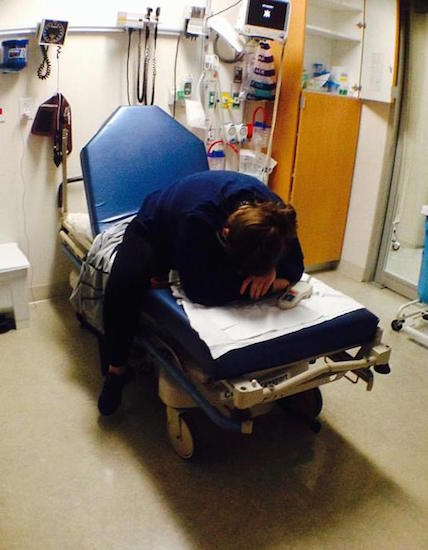When the Emergency Room Isn't Equipped for Your Chronic Illness
“It’s anxiety.”
“Your blood work looks fine.”
“That doesn’t make sense.”
“Have you talked to your psychiatrist?”
These are just a few things you might hear from the emergency room doctors.
Being chronically ill is absolutely no party. The doctors, the specialists, the appointments, the pokes, the needles, etc. You never really know what to expect. Explaining your symptoms is a job in and of itself sometimes.

Let’s not talk about the seriousness of the matter when your body just wants to break down completely and nobody wants to help you.
Better yet, nobody knows how to help you, because nobody wants to stop and listen to what is really going on. They see you as a frequent flyer, so they might label you either a drug seeker or an attention seeker. They don’t comprehend the amount of pain your stomach is in. They can’t comprehend that no matter what, everything you eat is being thrown up. They aren’t listening to you explain you are passing out and have no idea why. That your friends see you turn ghost-white, then blue and then you’re on the ground shaking.
Maybe if they would stop and listen, they would understand why this patient is so upset. So frustrated. Why she pulled out her own IV and end up collapsed on the ground, dizzy, crying. Maybe if they separated the fact that she was just there two days prior and focused on why she was there today — and maybe helped figure out why she is repeatedly in the ER. Instead, they gave up on her and walked away. They left the patient on the ground.
That doctor didn’t know she has been to multiple specialists, is scheduled for more specialists and is sick. The patient is not a drug seeker or attention seeker. She is just sick, in pain and wanting help when the doctor isn’t available.
This patient, this person, is me. I’ve been battling multiple diagnoses for a few years now, and recently something new has started up, and I’ve been pretty sick. I didn’t know what to do and broke down at the hospital. The first thing anyone does is judge me because I have multiple scars going down both my arms from cutting. But I am here because I need help, because I am sick. I don’t want to be here. I live at doctor’s appointments. I would do anything to have a normal day.
When I finished getting treatment that day after I ripped out my IV, that’s something I wont forget. I collapsed and couldn’t see. I was nauseous. I couldn’t stop crying. My nurse and medic just kept asking me what I wanted to do. I honestly didn’t know. But another nurse came out. She usually deals with me when I come in, and she got on her knee next to me. I just kept crying. I couldn’t stop. I felt awful and felt like this doctor just wasn’t listening to me. She did, though. She asked what was going on and encouraged me to stay. She didn’t want me to leave without feeling better. She didn’t give up on me.
She has no idea how close to giving up I was. By giving up, I mean going home and quitting, taking every piece of medication I own. But I didn’t. I was reminded that day that someone cared. That there is something worth fighting for. She did more and went beyond her job. I wont forget it.
I believe more and more emergency doctors are becoming like this with chronic illnesses. It’s become sickening, sad and hard on the lives of those dealing with being sick, as if their lives aren’t hard enough. “Repeat offenders” in the ER can get annoying, but think before you do something or say something. Think about it being your sister or brother. Try guiding them in the right direction or suggesting they could talk to their primary care physician so they don’t always have to come back. Emergency rooms might not be equipped to handle chronic illnesses, but sometimes that’s all people have.
So to the doctor who left his patient, next time, what if that was your kid? Or wife? Stop and think. Don’t judge a book by its cover.
If you or someone you know needs help, please visit the National Suicide Prevention Lifeline. You can also reach the Crisis Text Line by texting “START” to 741-741. Head here for a list of crisis centers around the world.
The Crisis Text Line is looking for volunteers! If you’re interesting in becoming a Crisis Counselor, you can learn more information here.
The Mighty is asking the following: Describe a moment you were met with extreme negativity or adversity related to your disability, disease or mental illness (or a loved one’s) and why you were proud of your response — or how you wish you could’ve responded. If you’d like to participate, please send a blog post to community@themighty.com. Please include a photo for the piece, a photo of yourself and 1-2 sentence bio. Check out our Submit a Story page for more about our submission guidelines.
